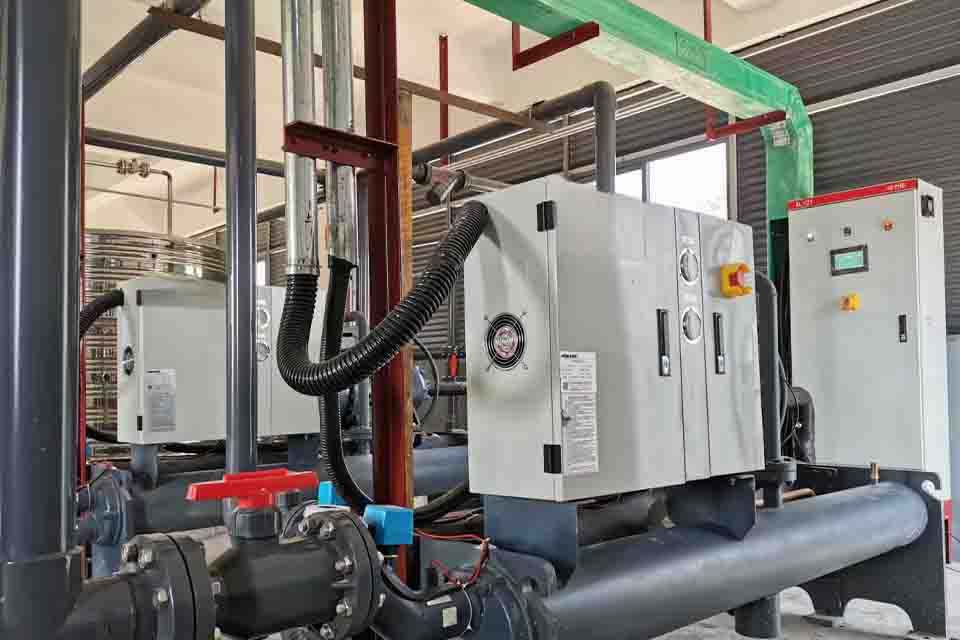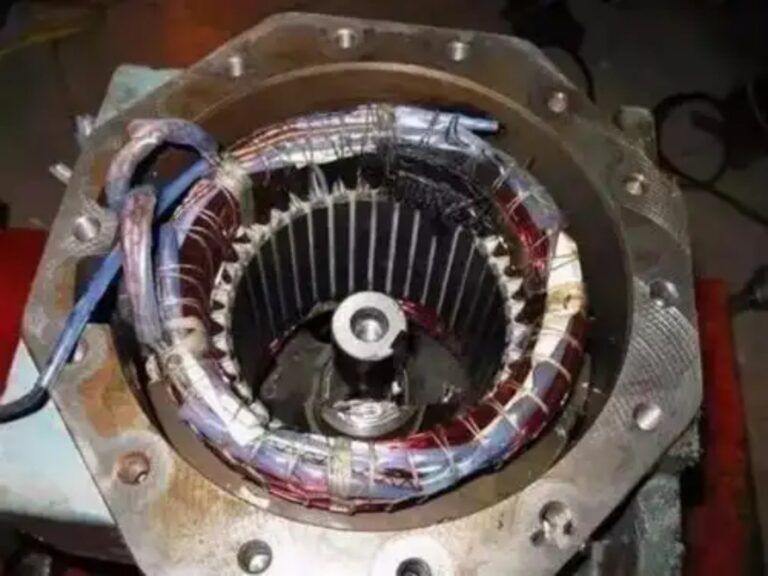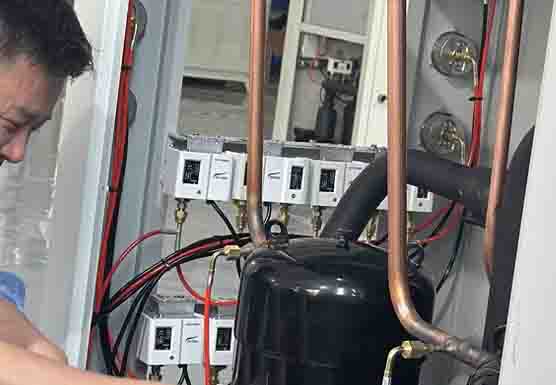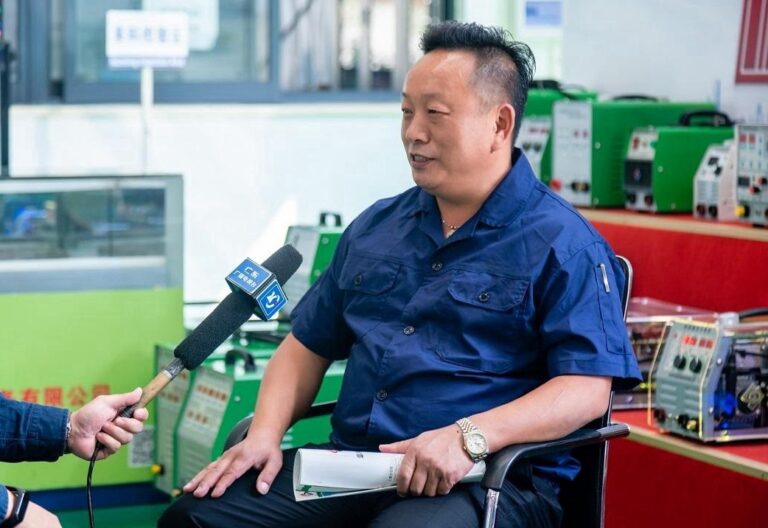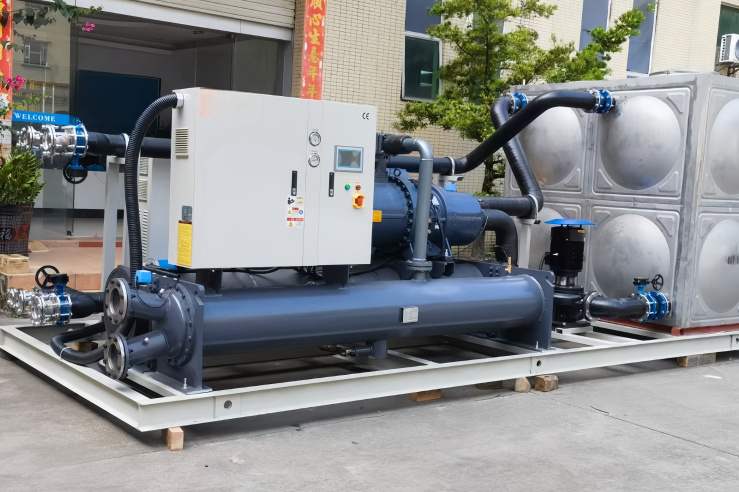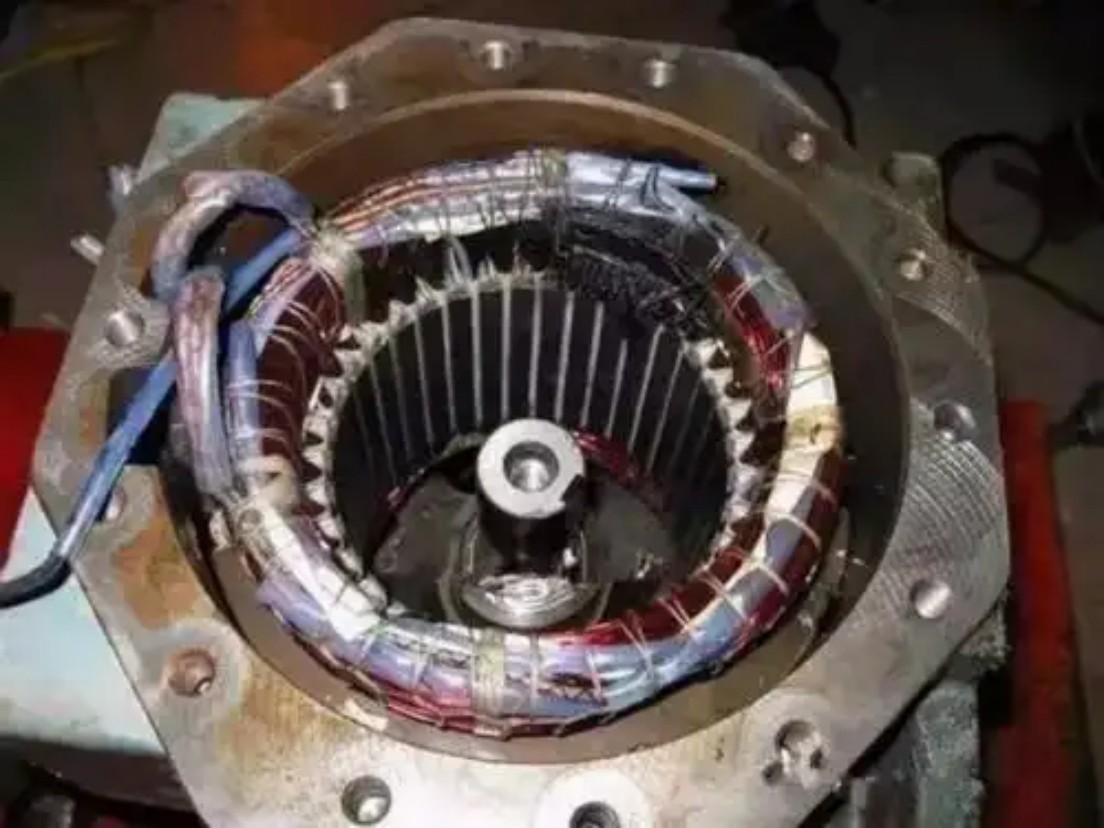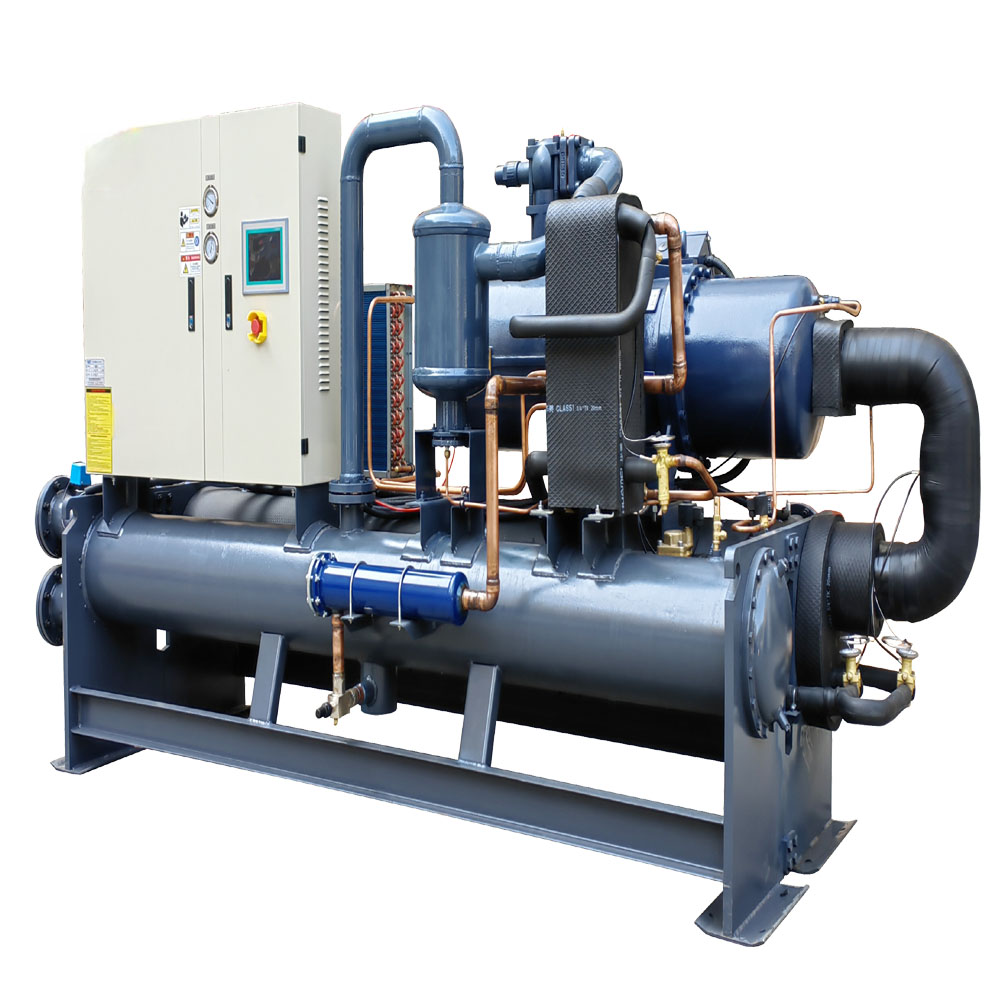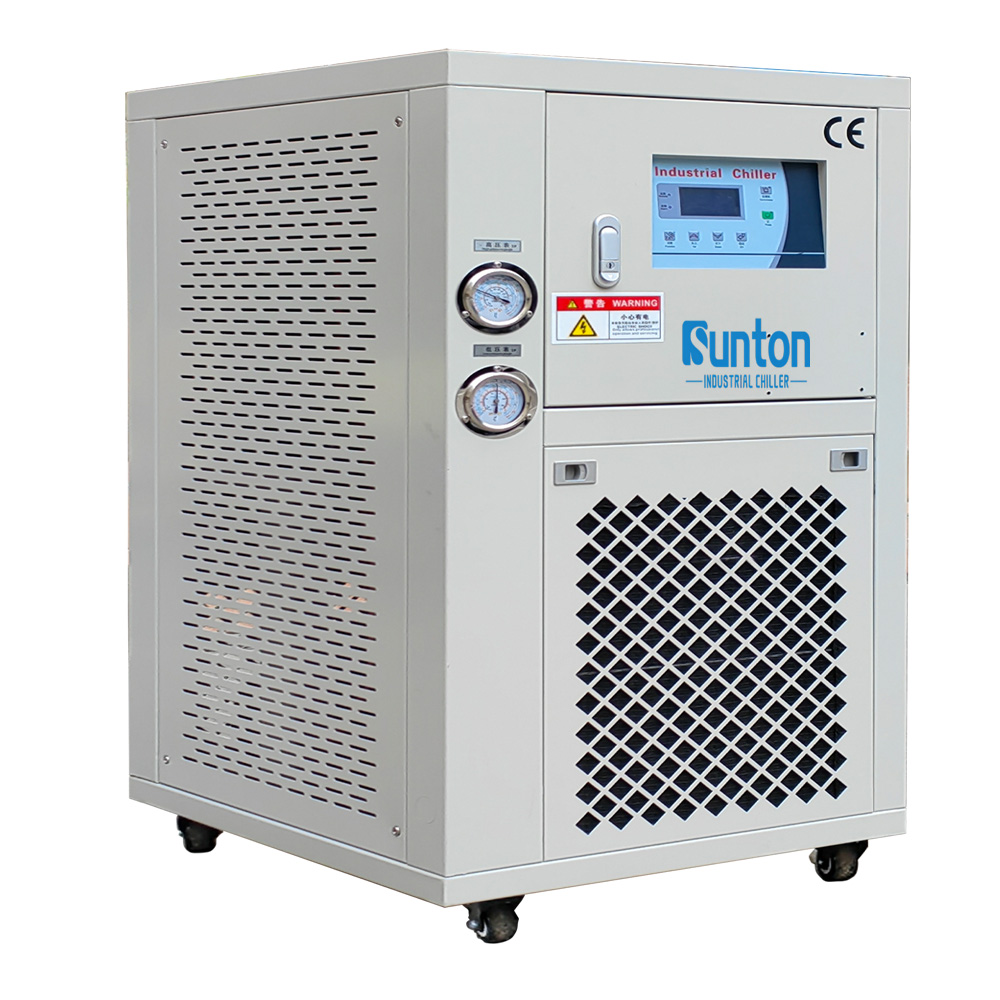-
Dalingshan Industrial Guangdong
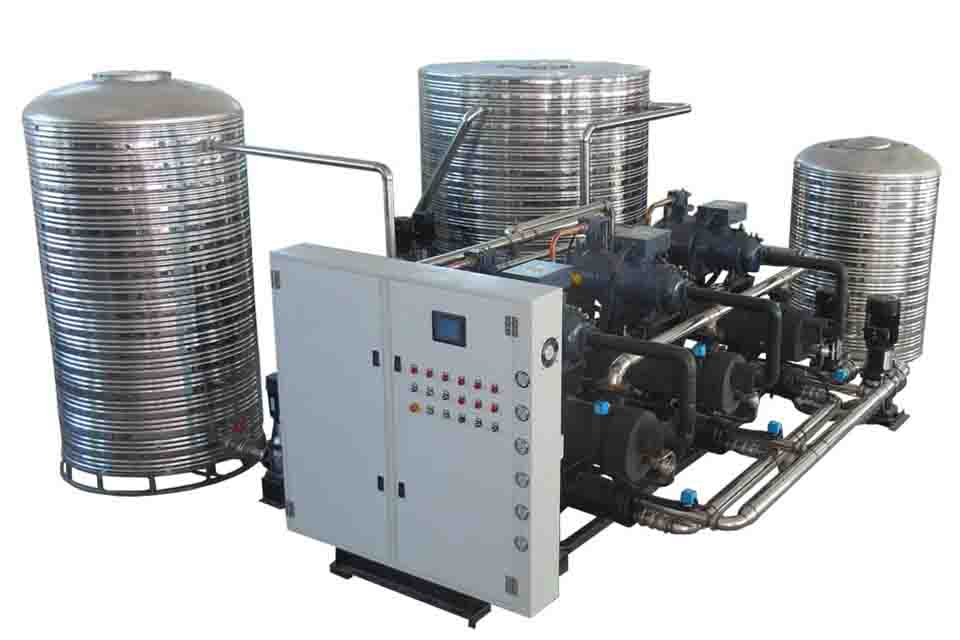
8 aplicações de resfriadores industriais
Sistema de resfriamento de processo industrial resfriado a ar de 8 toneladas: a solução de resfriamento definitiva
Este artigo irá aprofundar-se nas complexidades da indústria resfriadores, com foco específico em um 8 toneladas refrigerado a ar processo industrial sistema de resfriamento. Exploraremos como esses sistemas funcionam, suas aplicações em vários setores e por que entendê-los é crucial para empresas que buscam eficiência resfriamento soluções. Quer você esteja na indústria de plásticos, no setor de alimentos e bebidas ou gerenciando um data center, este artigo fornecerá insights valiosos sobre como selecionar, manter e otimizar seu refrigerador industrial sistema, o que o torna uma leitura útil para qualquer pessoa que queira melhorar sua eficiência operacional e qualidade do produto.
Índice
O que é um resfriador industrial e como ele funciona?
Como água industrial resfriador planta de fabricação, somos especializados na criação de alto desempenho resfriamento soluções adaptadas a uma ampla gama de indústrias. Uma refrigerador industrial é essencialmente um sistema de refrigeração que remove calor de um processo ou equipamento. Ao contrário dos condicionadores de ar padrão, resfriadores são projetados para lidar com as exigências resfriamento necessidades dos processos industriais. Os resfriadores industriais funcionam circulando um refrigerante, como água ou uma mistura de água/glicol, através do equipamento para absorver calor.
Chillers industriais desempenham um papel crítico em muitos processos ao garantir que a máquina opere dentro de faixas de temperatura ideais. Isso não apenas previne superaquecimento e danos potenciais, mas também melhora a eficiência e a longevidade do equipamento. Resfriadores use um ciclo de refrigeração por compressão de vapor ou por absorção para legal o fluido, que é então circulado para remover o calor do processo. O princípio básico envolve um refrigerante mudando de estado – de um gás de baixa pressão para um líquido de alta pressão e vice-versa – para transferir calor para longe do processo industrial.
Quais são os principais tipos de resfriadores industriais?
Existem principalmente dois tipos de resfriadores industriais: refrigerado a ar e resfriado a água. A escolha entre eles depende das necessidades específicas da aplicação. Chillers resfriados a ar usar o ar ambiente para dissipar o calor do refrigerante. Eles são normalmente usados em aplicações menores ou onde a disponibilidade de água é limitada. Essas unidades são mais fáceis de instalar e manter em comparação com resfriado a água resfriadores e geralmente são mais econômicos em termos de investimento inicial.
Chillers resfriados a água, por outro lado, use água de uma torre de resfriamento ou outra fonte de água para remover o calor. São ideais para processos industriais maiores que exigem maior resfriamento capacidade e temperaturas mais estáveis. O tipos de chillers influenciará a eficiência da dissipação do calor. A principal diferença está no método usado pelo condensador para rejeitar calor. Chillers resfriados a ar use ventiladores para soprar ar ambiente sobre as serpentinas do condensador, enquanto chillers resfriados a água usar água.
Por que escolher um chiller resfriado a ar de 8 toneladas?
Um 8 toneladas refrigerador refrigerado a ar representa um ponto ideal para muitas aplicações industriais, oferecendo um equilíbrio de resfriamento capacidade e eficiência. Este tamanho é particularmente adequado para operações de médio porte onde o controle preciso da temperatura é necessário, mas um maior resfriado a água sistema pode ser um exagero. Pela minha experiência, um refrigerador refrigerado a ar é preferível em ambientes onde a conservação da água é uma prioridade ou onde o espaço é escasso. Um Chiller refrigerado a ar de 8 toneladas também simplifica a instalação, pois não requer integração com um torre de resfriamento ou fonte de água.
Escolhendo o refrigerador industrial certo envolve avaliar seu resfriamento de processos necessidades, espaço disponível e orçamento. Um 8 toneladas a unidade é frequentemente selecionada por sua versatilidade, capaz de suportar uma variedade de aplicações industriais, desde a moldagem por injeção de plástico até o processamento de alimentos. A principal vantagem de um refrigerado a ar unidade é sua simplicidade e menores requisitos de manutenção, tornando-a uma opção atraente para muitas empresas. Nossos recursos fornecem a solução de resfriamento ideal para muitas necessidades industriais, entre em contato conosco hoje para saber mais.
Quais são os principais componentes de um sistema de resfriamento?
Compreendendo os principais componentes de um sistema de resfriamento é crucial para qualquer pessoa envolvida em sua operação ou manutenção. Os componentes primários incluem o compressor, condensador, válvula de expansãoe evaporador. O compressor é o coração do sistema, responsável por comprimir o refrigerante gás, o que aumenta sua temperatura e pressão. Como fabricante, garantimos que nossos compressores são robustos e eficientes, capazes de suportar os rigores do uso industrial contínuo.
O condensador então resfria a alta pressão refrigerante, fazendo com que ele se condense em um líquido. Em chillers resfriados a ar, isso é conseguido soprando ar sobre as serpentinas do condensador, enquanto em resfriado a água unidades, água é usado. O válvula de expansão reduz a pressão do líquido refrigerante, permitindo que ele se expanda e esfrie ainda mais. Finalmente, o evaporador absorve calor do fluido de processo, causando o refrigerante para vaporizar e reiniciar o ciclo.
Como os resfriadores industriais usam refrigerante no processo de resfriamento?
Refrigerante é a força vital de qualquer refrigerador industrial, desempenhando um papel fundamental na processo de resfriamento. A escolha de refrigerante pode impactar significativamente a eficiência e a pegada ambiental do sistema. Resfriadores usar refrigerante para absorver e transferir calor para longe do processo. O processo começa quando gás de baixa pressão entra no compressor. Dentro do compressor, o gás é comprimido, levando a um aumento tanto em sua pressão quanto em sua temperatura.
Este gás de alta pressão e alta temperatura move-se então para o condensador, onde libera calor e condensa em um líquido de alta pressão. Em refrigerado a ar sistemas, esse calor é dissipado no ar ambiente, enquanto em resfriado a água sistemas, é levado pelo água do condensador. O líquido de alta pressão passa então através do válvula de expansão, onde sua pressão cai, fazendo com que ele esfrie e evapore parcialmente. Finalmente, esse frio, de baixa pressão refrigerante flui através do evaporador, absorvendo calor do processo fluido e vaporizando completamente, antes de retornar ao compressor para repetir o ciclo.
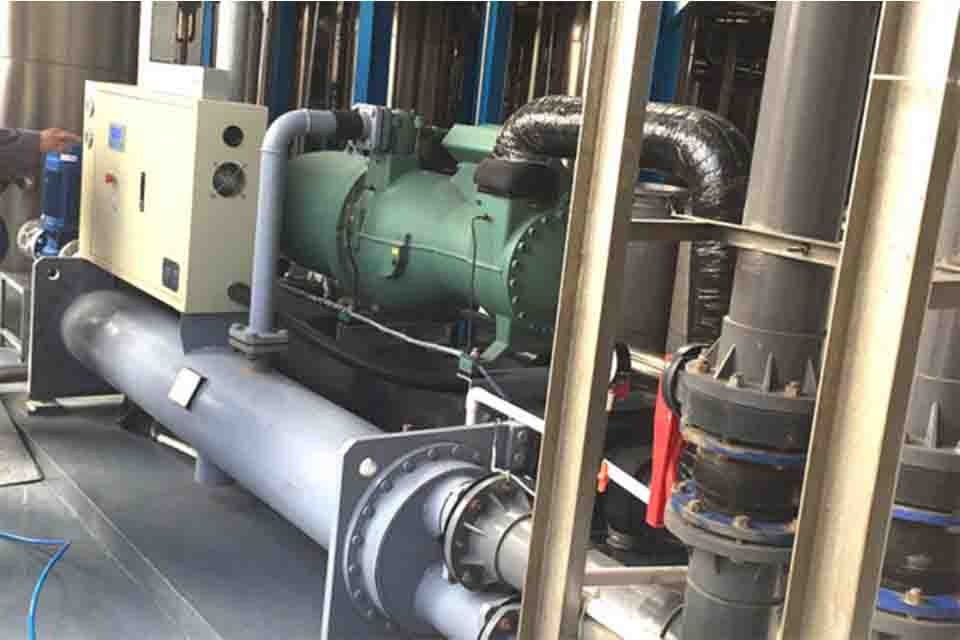
Quais indústrias se beneficiam mais das aplicações de resfriadores industriais?
Aplicações de resfriadores industriais são vastos e variados, com muitos setores contando com esses sistemas para manter a qualidade do produto e a eficiência operacional. A indústria de plásticos e borracha, por exemplo, usa resfriadores para resfriar moldes e produtos extrudados, garantindo estabilidade dimensional e prevenindo defeitos. Da mesma forma, a indústria de usinagem utiliza resfriadores de processo para resfriar ferramentas de corte e peças de trabalho, melhorando a precisão e prolongando a vida útil da ferramenta.
A indústria de alimentos e bebidas se beneficia significativamente refrigeradores industriais, usando-os para resfriar ingredientes, manter temperaturas de fermentação e preservar produtos perecíveis. Nos setores químico e farmacêutico, resfriadores são essenciais para controlar as temperaturas de reação e garantir a segurança e estabilidade dos processos. Outras indústrias que dependem fortemente de resfriadores incluem fabricação de eletrônicos, corte a laser, impressão, imagens médicas e data centers.
Aqui está uma tabela resumindo algumas indústrias importantes e seus usos específicos para refrigeradores industriais:
| Indústria | Caso de uso |
| Plásticos e Borracha | Moldes de resfriamento, produtos extrudados |
| Usinagem | Resfriamento de ferramentas de corte, peças de trabalho |
| Alimentos e Bebidas | Resfriadores de glicol industriais para cervejarias , Ingredientes de resfriamento, fermentação |
| Química e Farmacêutica | Controlando temperaturas de reação |
| Eletrônica | Resfriamento de componentes sensíveis, placas de circuito |
| Laser | Cabeças de laser de resfriamento, óptica |
| Impressão | Manutenção da viscosidade da tinta, rolos de resfriamento |
| Médico | Resfriamento de máquinas de ressonância magnética e outros equipamentos de imagem |
| Centros de Dados | Resfriamento de servidores, manutenção de condições operacionais ideais |
Qual o papel de uma torre de resfriamento no resfriamento industrial?
Enquanto chillers resfriados a ar dependem do ar ambiente para dissipação de calor, chillers resfriados a água frequentemente utilizam um torre de resfriamento como parte de sua resfriamento sistema. Um torre de resfriamento é um trocador de calor especializado que remove o calor da água evaporando uma pequena porção dela. Isto resfriamento evaporativo processo permite que a água restante seja resfriada significativamente, que é então usada para absorver calor no condensador do chiller.
Torres de resfriamento são particularmente eficazes em grandes aplicações industriais onde uma quantidade significativa de calor precisa ser dissipada. Ao usar um torre de resfriamento, chillers resfriados a água podem atingir temperaturas de condensação mais baixas, levando a uma melhor eficiência energética e desempenho. No entanto, eles também exigem manutenção regular para evitar problemas como incrustação, corrosão e crescimento biológico, que podem impactar sua eficácia. Torre de resfriamento são componentes cruciais, usando um torre de resfriamento pode melhorar significativamente o desempenho de resfriado a água sistemas.
Como selecionar o melhor resfriador industrial para suas necessidades?
Escolhendo o melhor refrigerador industrial para suas necessidades específicas requer consideração cuidadosa de vários fatores. Primeiro, você precisa determinar o resfriamento capacidade necessária, normalmente medida em toneladas ou BTUs por hora. Isso dependerá da quantidade de calor que seu processo gera e da redução de temperatura desejada. Em seguida, você deve avaliar o tipo de resfriador que melhor se adapta à sua aplicação, considerando fatores como disponibilidade de água, restrições de espaço e eficiência energética.
Também é essencial considerar o ambiente operacional e quaisquer requisitos específicos, como a necessidade de controle preciso de temperatura ou resistência a substâncias corrosivas. Como fabricante, oferecemos uma ampla gama de indústria resfriadores projetado para atender a diversas necessidades, e nossa equipe pode ajudá-lo a navegar por essas considerações para selecionar o refrigerador industrial certo para sua aplicação. Lembre-se, investir no direito resfriador pode levar a benefícios significativos de longo prazo, incluindo melhor qualidade do produto, redução de custos operacionais e aumento da vida útil do equipamento. Selecionando o refrigerador certo é crucial para otimizar o desempenho e alcançar os resultados desejados.
Quais são as melhores práticas para manutenção de resfriadores industriais?
Manutenção industrial resfriadores é crucial para garantir seu desempenho e confiabilidade a longo prazo. A manutenção regular pode ajudar a evitar quebras inesperadas, reduzir o consumo de energia e estender a vida útil do seu equipamento. Como fabricante, recomendamos seguir um cronograma de manutenção abrangente que inclua inspeções de rotina, limpeza e verificações de componentes.
Um aspecto fundamental de manutenção do refrigerador é garantir a qualidade adequada da água, especialmente em resfriado a água sistemas. Isso envolve monitorar e controlar fatores como pH, dureza e sólidos dissolvidos para evitar incrustações, corrosão e crescimento biológico. Também é importante inspecionar e limpar regularmente componentes como o condensador e evaporador serpentinas, bem como filtros e peneiras. Além disso, a verificação refrigerante Os níveis de pressão e o monitoramento do sistema podem ajudar a identificar possíveis problemas antes que eles aumentem.
Por que a eficiência energética é importante na refrigeração industrial?
Eficiência energética é uma consideração crítica em refrigeração industrial, impactando tanto os custos operacionais quanto a sustentabilidade ambiental. Eficiente resfriadores consomem menos energia para atingir o mesmo nível de resfriamento, resultando em contas de serviços públicos mais baixas e uma pegada de carbono reduzida. Como fabricante, estamos comprometidos em projetar e produzir produtos com eficiência energética resfriadores que ajudam nossos clientes a atingir suas metas de sustentabilidade, minimizando as despesas operacionais.
Vários fatores contribuem para a eficiência energética de um refrigerador industrial, incluindo o tipo de compressor utilizados, a eficiência dos trocadores de calor e a sofisticação do sistema de controle. Moderno resfriadores frequentemente incorporam recursos como acionamentos de velocidade variável, eletrônicos válvulas de expansão, e algoritmos de controle avançados que otimizam o desempenho sob cargas variáveis. Ao investir em um sistema de eficiência energética resfriador, as empresas podem obter economias significativas a longo prazo e demonstrar seu comprometimento com a responsabilidade ambiental.
Perguntas frequentes
Qual é a diferença entre chillers resfriados a ar e resfriados a água?
Chillers resfriados a ar usar ar ambiente para resfriar o refrigerante, enquanto chillers resfriados a água usar água, muitas vezes em conjunto com um torre de resfriamento. Refrigerado a ar As unidades são normalmente mais fáceis de instalar e manter, enquanto resfriado a água As unidades são geralmente mais eficientes, especialmente em grandes aplicações. Existem dois principais tipos de resfriadores industriais: refrigerado a ar e refrigerado a água.
Com que frequência os chillers industriais devem passar por manutenção?
A frequência do serviço depende de fatores como o tipo de resfriador, condições de operação e recomendações do fabricante. Geralmente, é aconselhável ter refrigeradores industriais inspecionado e revisado pelo menos uma vez por ano, com verificações mais frequentes para componentes críticos. A manutenção adequada é essencial para manter seu equipamento legal e operando com eficiência.
Qual é a vida útil típica de um refrigerador industrial?
Com a manutenção adequada, refrigeradores industriais pode durar de 15 a 20 anos ou até mais. No entanto, a vida útil real pode variar dependendo de fatores como padrões de uso, ambiente operacional e qualidade do equipamento. Manutenção regular e reparos oportunos podem estender significativamente a longevidade do equipamento.
Os chillers industriais podem ser usados para resfriamento e aquecimento?
Alguns refrigeradores industriais, conhecido como bomba de calor resfriadores, são capazes de fornecer ambos resfriamento e aquecimento. Esses sistemas podem reverter o ciclo de refrigeração para transferir calor para o processo fluido em vez de removê-lo. Refrigeradores também fornecem recursos de aquecimento em alguns modelos.
Que tipo de refrigerante é usado em chillers industriais?
O tipo de refrigerante usado em refrigeradores industriais pode variar dependendo de fatores como refrigerador projeto, resfriamento capacidade e regulamentações ambientais. Comum refrigerantes incluem HFCs como R-134a e R-410A, bem como opções mais novas e ecologicamente corretas, como HFOs.
Como sei qual o tamanho do refrigerador que preciso?
Determinando o tamanho certo resfriador envolve o cálculo da carga de calor do seu processo e a redução de temperatura desejada. Os fatores a serem considerados incluem a vazão e o calor específico do processo fluido, bem como as temperaturas de operação e as condições ambientais. Consultar um resfriador fabricante ou um profissional de HVAC qualificado pode ajudar a garantir que você selecione o tamanho apropriado. Nosso Resfriador de água de parafuso resfriado a água são projetados para atender a uma ampla gama de indústria aplicações, garantindo que você obtenha o refrigerador industrial certo para suas necessidades.
Principais conclusões
- Chillers industriais são essenciais para manter temperaturas operacionais ideais em uma ampla gama de indústrias, desde plásticos e usinagem até processamento de alimentos e data centers.
- Existem dois tipos principais de refrigeradores industriais: refrigerado a ar e resfriado a água, cada um com suas próprias vantagens e casos de uso ideais.
- Um 8 toneladas refrigerador refrigerado a ar oferece um equilíbrio de resfriamento capacidade e eficiência, tornando-o adequado para muitas aplicações industriais de médio porte.
- Principais componentes de um sistema de resfriamento incluir o compressor, condensador, válvula de expansãoe evaporador, todos trabalhando juntos para transferir calor do processo.
- Escolhendo o melhor refrigerador industrial envolve considerar fatores como resfriamento capacidade, resfriador tipo, ambiente operacional e eficiência energética.
- A manutenção regular, incluindo inspeções, limpeza e verificações de componentes, é crucial para garantir o desempenho e a confiabilidade a longo prazo. refrigeradores industriais.
- Eficiência energética é uma consideração crítica em refrigeração industrial, impactando tanto os custos operacionais quanto a sustentabilidade ambiental.
- Como fabricante, estamos comprometidos em fornecer produtos de alta qualidade e com eficiência energética resfriadores adaptado às necessidades específicas dos nossos clientes em vários setores.
Lembre-se, se precisar de ajuda para selecionar ou manter um refrigerador industrial, não hesite em Contate-nos. Nossa equipe de especialistas está pronta para ajudá-lo a encontrar o lugar perfeito resfriamento solução para suas necessidades. Resfriadores anti-explosão são apenas um exemplo de nossas ofertas de produtos especializados, projetados para atender a desafios industriais exclusivos. Também oferecemos Chillers centrais de parafuso resfriados a ar, fornecendo serviços eficientes e confiáveis resfriamento para aplicações maiores. Para aqueles que precisam de uma solução abrangente resfriamento soluções, nossas Chillers HVAC são projetados para oferecer desempenho excepcional. Também entendemos as necessidades específicas de indústrias como a agricultura, e é por isso que oferecemos produtos especializados Resfriadores industriais para agricultura para garantir desempenho ideal nesses ambientes.
